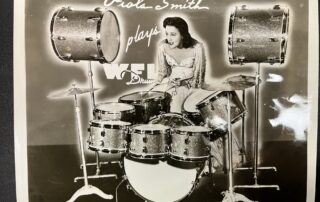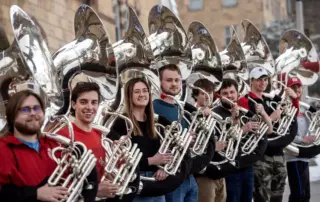There is a picture of Mari Koopman as a little girl, smiling and wearing a tutu. “When I first did ballet, I was probably four and it was regular ballet,” says Mari. “I did it with my best friend. It was carefree. We’re all like twirling around but we’re having the time of our life.”
That was Mari’s last time as a standing dancer. “When I was four, my special needs kicked in and I mean, you don’t really know how you’re going to dance.”
J Matzner remembers the start of her dancing career. “My mother put me into dance because she didn’t think I was very coordinated. I do remember that I was about four or five and I remember being in my very first dance recital. I never really stopped until I had a life-threatening illness. It’s the first time movement had ever been taken away from me. It gave me insight, I feel, into what others experience when they can’t move.”
Now an adult, Matzner is Mari’s instructor at the Kehl School of Dance in Verona. “As I was recovering, I thought, ‘Oh, I’ll just join some accessible dance classes now and start getting some of that core strength back’ and I was very surprised to find that, at least in the Madison area, there really weren’t any accessible dance classes. That was one of the reasons why later on I decided to start one.”
Mari spent nearly five years without ballet. “It took a while for us to find wheelchair ballet. I mean it took like years and years. When we found it, we were like overjoyed and we wanted to do it like immediately.”
“An accessible dance class is very much like any class,” says Matzner. “The teacher comes. They show the step. They help the dancer feel what it’s like on their own body. Every person is limited by their own body structure. Dance really lends itself to meeting everyone where they are at their own ability.”
Mari Koopman has known Matzner for three years. “She’s much more than a teacher to me. She’s a friend that I get to hug every week and a person who I can laugh with and dance with. She doesn’t think it’s sad that we have special needs. She makes it an opportunity to make us stronger.”
As Mari has progressed, Matzner has taught her new dances. “First we had our classical ballet dance. We had a Broadway-style dance. This year we’re learning Flamenco.”
Tania Tandias is a local Flamenco instructor. She offered to choreograph a dance for Mari. “What you want to think of with Spanish dance is that you want to really stretch out your arms,” says Tandias.
“It’s different from the other dances that I’ve done,” says Mari. “It’s really fun to like just be sassy in the dance I guess.”
“Wheelchair ballet is a thing that it’s just such a gift,” says Mari. “It changed my life. Like going back to like the first year, the feeling, it didn’t mean that I had special needs. It meant that I could do something amazing and I didn’t have to be ashamed of anything. I didn’t feel all lost because of my special needs. I felt hope.”
“She likes to say that she just really loves dance. That it’s in her heart and soul,” says Matzner. “And I think it really is.”
“I’m Mary the dancer. It’s part of me. Even though I had special needs I could do something so incredible that not a lot of people can do. That just made my heart really fill with joy. I don’t have to be a girl known as a girl in the wheelchair. I can be known as a girl who can dance very well.”
Olive
Mari’s service dog, Olive, goes with her everywhere, and in some places might be more popular than Mari.










